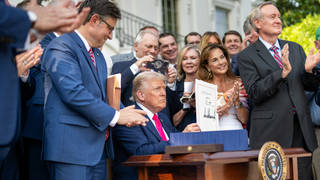
Tens of thousands gathered in Atlanta, Georgia this past weekend for the Keep the Vote Alive March. The march commemorated the 40th anniversary of the historic 1965 signing of the Voting Rights act and called for the Congress and the President to extend key provisions of the law which expire in 2007. [includes rush transcript]
On Saturday, tens of thousands gathered from around the country to attend the Keep the Vote Alive march in Atlanta Georgia, which commemorated the 40th anniversary of the signing of the landmark Voting Rights Act.
The march was led by Reverend Jesse Jackson, founder of the Rainbow/PUSH coalition, and Bruce Gordon, the new president of the NAACP. Organizers said that their goal was not just to remember the historic signing of the act but to push for Congress and President Bush to extend key provisions of the law which expire in 2007.
President Lyndon Johnson signed the Voting Rights Act on August 6th 1965. The law was designed to reverse years of African-American disenfranchisement in this country. Despite the Fifteenth and Nineteenth Amendments to the U.S. Constitution, which had given Black men and women the right to vote, southern voter registration boards used poll taxes, literacy tests, and other bureaucratic impediments to deny African Americans their legal rights. Southern blacks also risked harassment, intimidation, economic reprisals, and physical violence when they tried to register or vote. The Voting Rights Act grew out of public protest, which culminated in the Selma to Montgomery marches of 1965. At the first of these three marches—known as Bloody Sunday—state troopers attacked the peaceful demonstrators with billy clubs, tear gas, and bull whips on the Edmund Pettus bridge in Selma, Alabama.
The Voting Rights Act was signed later that year and empowered the federal government to oversee voter registration and elections in counties that had used tests to determine voter eligibility or where registration or turnout had been less than 50% percent in the 1964 presidential election. The act also banned discriminatory literacy tests and expanded voting rights for non-English speaking Americans. At the time the law was enacted, there were three black members of Congress. Today there are forty-one members in the House of Representatives and one black senator. There are also twenty-two Latino House members and two Latino Senators compared with five members of Congress in 1965.
We hear from some of the speakers who who spoke at the march.
- Rep. John Lewis, (D-GA). He was a survivor of the Bloody Sunday march
- Rep. Cynthia McKinney, (D-GA)
- Rev. Jesse Jackson, Rainbow/PUSH Coalition
- Rep. Charlie Rangel, (D-NY)
Transcript
AMY GOODMAN: We turn now for the rest of the program to look at the history and the future of the 1965 Voting Rights Act.
REP. JOHN LEWIS: 40 years later, we are still marching for the right to vote. So I say to each and every one of you, thank you for being here. Don’t give up. Don’t give in. Keep your faith and keep your eyes on the prize. 40 years ago when Hosea Williams — when I walked across that bridge with Hosea Williams 40 years ago, we were beaten, we were tear gassed, we were bullwhipped, we were hurt, but we didn’t give up, and you must not give up 40 years later. The Voting Rights Act was good in 1965, and it is good in 2005, and those of us in the Congress will do our part to see that it is reauthorized.
AMY GOODMAN: That was Georgia Democratic Congress member, John Lewis, speaking on Saturday in Atlanta, Georgia. He and tens of thousands of others from around the country attended the “Keep the Vote Alive” march, which commemorated the 40th anniversary of the signing of the landmark Voting Rights Act. The march was led by the Reverend Jesse Jackson, founder of the Rainbow/PUSH Coalition, and Bruce Gordon, the new president of the NAACP. Organizers said their goal was not just to remember the historic signing of the act but push for Congress and President Bush to extend key provisions of the law, which expire in 2007.
President Lyndon Johnson signed the Voting Rights Act on August 6, 1965. The law was designed to reverse years of African American disenfranchisement in this country. Despite the 15th and 19th Amendments to the U.S. Constitution, which had given black men and women the right to vote, Southern voter registration boards used poll taxes, literacy tests, and other bureaucratic impediments to deny African Americans their legal rights. Southern blacks also risked harassment, intimidation, economic reprisals, physical violence, when they tried to register or vote. The Voting Rights Act grew out of public protest, which culminated in the Selma to Montgomery marches of 1965. At the first of these three marches, known as Bloody Sunday, state troopers attacked the peaceful demonstrators with billy clubs, tear gas, and bull whips on the Edmund Pettus bridge in Selma, Alabama. John Lewis was one of those who survived that day.
The Voting Rights Act was signed later that year and empowered the federal government to oversee voter registration and elections in counties that had used tests to determine voter eligibility or where registration or turnout had been less than 50% in the 1964 Presidential Election. The act also banned discriminatory literacy tests and expanded voting rights for non-English speaking Americans. At the time the law was enacted, there were three black members of Congress. Today there are 43. There are also 25 Latino House members and one Latino Senator, compared with five members of Congress in 1965. We’re going to talk later in the program about the call for an extension of the Voting Rights Act, but first we go to some of the speakers at the Saturday march in Atlanta. The footage coming courtesy of Link TV.
[break]
AMY GOODMAN: Stevie Wonder at the historic march on Saturday, commemorating the historic act that was passed on that day, August 6, 1965, the Voting Rights Act. We turn now to continuation of this historic moment 40 years after the signing of the Voting Rights Act. On Saturday, one estimate, 100,000 people rallied in Atlanta. Georgia Congress member Cynthia McKinney addressed them.
REP. CYNTHIA McKINNEY: If we are to avoid the strange fruit of powerlessness, we have to pass the torch of leadership to a new generation of young, strong, uncompromising tree shakers. We can no longer be satisfied with leaders hand-picked for us and not by us, because it’s that strange fruit that wrecks our dreams and kills our community; the strange fruit that occurs when other people assume our powerlessness, and we act accordingly; the strange fruit of Bakke, Croson, Adarand, Shaw v. Reno, Johnson v. Miller and Gratz, each iteration more contorted and perverted than the version before it; strange fruit like Kenneth Walker, dead at the hands of the Columbus, Georgia Police; strange fruit like Frederick Williams, tasered to death by the Gwinnett County Police; strange fruit like Bernard Burden, found hanging from a tree in Coweta County.
America’s tree of opportunity is becoming twisted and dead, because America is becoming devoid of tree shakers, people unafraid to take a stand, voicing dissent, throwing their bodies against the levers and the wheels of the machine in order to make a difference. Dr. King’s bounced check still bounces back every day, marked “insufficient funds,” because we allow America not to pay. Halliburton gets paid billions and billions and billions of dollars. But our black farmers have yet to be paid, despite winning in America’s court of law. That should be a lesson for us. And how twisted the tree of opportunity becomes when we fail to follow through with vigorous agitation and tree shaking, sewing the seeds of justice for the next generation. But today we are here to demand our due: Life, liberty, and the right to vote on machines that we know will accurately count our vote. And on this, we will not be hoodwinked, snookered, bought out or even bushwhacked. Up, you mighty race! You can accomplish what you will. No more strange fruit!
AMY GOODMAN: Congress member Cynthia McKinney speaking in her home state of Georgia. The Reverend Jesse Jackson led the voting rights march this weekend with NAACP President, Bruce Gordon. This is Reverend Jackson.
REV. JESSE JACKSON: Today, we have this splendid coalition. 40 years ago for the first time in 346 years, African Americans gained the right to vote. The price we paid was of the lives of the martyrs 40 years ago. None paid a dearer price than Congressman John Lewis, another hand for him. Congressman John Lewis, 40 years ago. The late brother Hosea Williams. Put your hands together for Hosea Williams. Say “right to vote!”
CROWD: Right to vote!
REV. JESSE JACKSON: For Dr. King, who sits high and looks to our big hand for Dr. King, let me really hear you scream. 40 years later, the voter — the right to vote is not in danger, it’s to protect us against race discrimination, protection against language discrimination. We want the right to vote enforced. Say “freedom!”
CROWD: Freedom!
REV. JESSE JACKSON: Without the troops.
CROWD: Without the troops.
REV. JESSE JACKSON: Opens up.
CROWD: Opens up.
REV. JESSE JACKSON: For the Klan.
CROWD: For the Klan.
REV. JESSE JACKSON: We want freedom.
CROWD: We want freedom.
REV. JESSE JACKSON: And protection.
CROWD: And protection.
REV. JESSE JACKSON: And reconstruction.
CROWD: And reconstruction.
REV. JESSE JACKSON: Freedom.
CROWD: Freedom.
REV. JESSE JACKSON: And protection.
CROWD: And protection.
REV. JESSE JACKSON: And reconstruction.
CROWD: And reconstruction.
REV. JESSE JACKSON: Right to vote.
CROWD: Right to vote.
REV. JESSE JACKSON: Right to organize.
CROWD: Right to organize.
REV. JESSE JACKSON: And the end of war.
Crowd: And the end of war.
REV. JESSE JACKSON: Right to vote.
CROWD: Right to vote.
REV. JESSE JACKSON: Right to organize.
CROWD: Right to organize.
REV. JESSE JACKSON: And the end of war.
Crowd: And the end of war.
REV. JESSE JACKSON: Let’s live together.
Crowd: Let’s live together.
REV. JESSE JACKSON: As brothers and sisters.
Crowd: As brothers and sisters.
REV. JESSE JACKSON: And not die apart.
Crowd: And not die apart.
REV. JESSE JACKSON: As fools.
Crowd: As fools.
REV. JESSE JACKSON: Let nobody.
Crowd: Let nobody.
REV. JESSE JACKSON: Break your spirit.
Crowd: Break your spirit.
REV. JESSE JACKSON: Never surrender.
Crowd: Never surrender.
REV. JESSE JACKSON: Never surrender.
Crowd: Never surrender.
REV. JESSE JACKSON: Keep hope.
Crowd: Keep hope.
REV. JESSE JACKSON: Alive.
Crowd: Alive.
REV. JESSE JACKSON: Let me hear you scream.
AMY GOODMAN: That was the Reverend Jesse Jackson, one of the leaders of the Voting Rights Act commemoration and demand for renewal in Atlanta this weekend.
[break]
AMY GOODMAN: We turn now to Congress member Charles Rangel, who was also speaking at the Voting Rights Act rally that took place in Atlanta this weekend.
REP. CHARLES RANGEL: Forty years ago, so many of us thought that we had won the battle, but we just begun the fight. And just as we pray for those people that we’re losing in Iraq, we must never, never forget those people who gave up their lives in the civil rights struggle so that we can be here today. And one day someone may be asking,: What were we doing when they tried to take it away from us? And I think by coming out here with John Lewis and Andrew Young and Jesse Jackson and all of you, you’ll be able to tell the next generation that you never gave in and you never get out. When we went and won the Voters Right Act, and John Conyers was in the Congressional Black Caucus, and I joined in 1971, we only had 13 African Americans in the House of Representatives. Because of the Voting Rights Act, we stand before you with 43 strong black men and women in the Congressional Black Caucus, with one in the Senate. I hope God will give us the day that you’ll be able to say in your generation, you had doubled that number.
AMY GOODMAN: New York Congress member Charles Rangel, speaking at the 40th anniversary of the 1965 Voting Rights Act in Atlanta. Tens of thousands of people marched.













Media Options